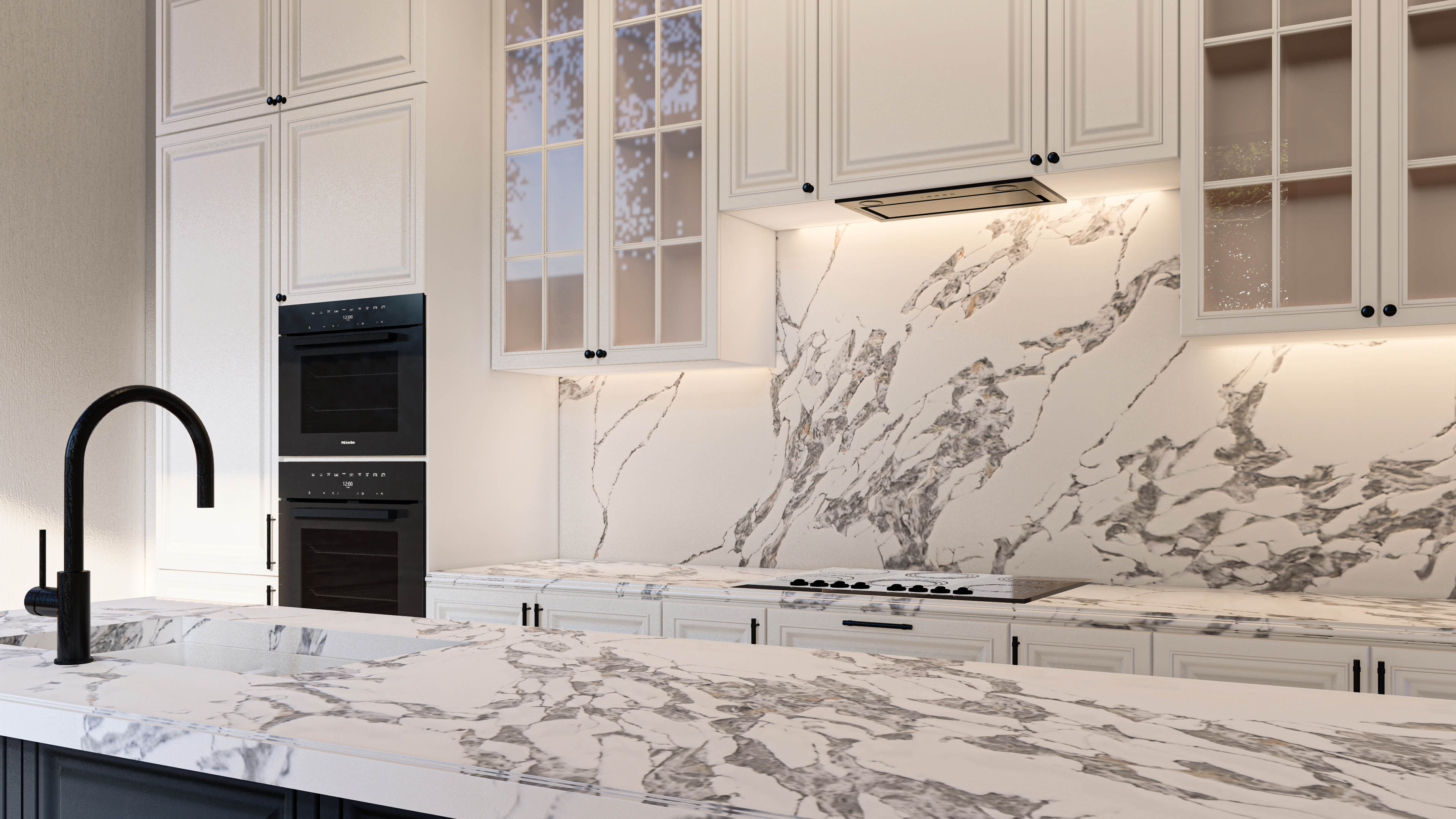
When designing a kitchen, selecting the right worktop material is a crucial decision. Stone surfaces are not only a visual focal point, but they also endure the daily wear and tear of food prep, spills, heat, and cleaning. Choosing the right surface—one that balances aesthetics with practical durability and maintenance—can greatly impact the longevity and functionality of your kitchen. At NobleStone UK, we specialise in high-quality quartz, porcelain, granite, and marble worktops. In this guide, we’ll help you understand how each of these stone surfaces performs in a kitchen environment and how to maintain them for long-term satisfaction.
Durability: Quartz is one of the most popular kitchen worktop materials due to its outstanding durability. As an engineered stone composed of natural quartz crystals and resin, it is non-porous, stain-resistant, and resistant to chips and scratches.
Kitchen Maintenance: Quartz is ideal for busy kitchens. It doesn’t require sealing and can be easily cleaned with a soft cloth and mild soap. However, it’s best to use trivets for hot pans, as extreme heat can damage the resin.
Best For:
Durability: Porcelain slabs are known for their strength and resistance to heat, scratches, and UV exposure. Because it’s non-porous and compact, porcelain doesn’t absorb stains or odours, making it an ideal kitchen material.
Kitchen Maintenance: Porcelain is exceptionally easy to maintain. It doesn’t require sealing, and daily cleanup with warm water or gentle cleaners keeps it looking pristine. It’s also safe for hot cookware placement.
Best For:
Durability: Granite is a natural stone with a unique look and exceptional strength. It is highly resistant to heat and scratching, though it is porous and needs regular sealing to prevent staining from oil or acidic foods.
Kitchen Maintenance: Granite should be sealed annually to maintain its resistance to moisture and stains. Wipe up spills quickly, especially from wine, citrus, and cooking oils. Use mild, non-acidic cleaners.
Best For:
Durability: Marble is prized for its elegant veining and natural beauty, but it's softer and more porous than other stones. It scratches easily and is particularly vulnerable to acid etching and staining in a kitchen setting.
Kitchen Maintenance: Marble should be sealed frequently and cleaned using only pH-neutral cleaners. Avoid letting lemon juice, vinegar, or wine sit on the surface. It's more suited to lower-use kitchen areas like baking stations or breakfast bars.
Best For:
| Surface Type | Durability | Heat Resistance | Stain Resistance | Maintenance | Sealing Required |
|---|---|---|---|---|---|
| Quartz | Excellent | Moderate | Excellent | Low | No |
| Porcelain | Excellent | High | Excellent | Very Low | No |
| Granite | High | High | Moderate | Moderate | Yes |
| Marble | Moderate | Moderate | Low | High | Yes |
Use Cutting Boards: Avoid chopping directly on stone to protect both the surface and your knives.
Wipe Up Spills Quickly: Especially important for granite and marble to prevent staining.
Use Heat Protection: Always place hot pans on trivets or heat mats unless the surface is porcelain or granite.
Avoid Harsh Cleaners: Stick to pH-neutral cleaners or mild soap and water.
Reseal When Needed: Follow a regular sealing schedule for granite and marble.
Note: This content is advisory. Results may vary based on the specific stone finish and product composition. Some engineered surfaces, such as 3D printed quartz, may react differently to certain cleaning agents, including vinegar. Always consult your manufacturer before applying any product.
Final Thoughts
Your kitchen worktop is a daily-use surface that should combine beauty with resilience. While all stone surfaces offer unique advantages, choosing the right one depends on how often and how intensively you use your kitchen. Quartz and porcelain are standout options for those who want low-maintenance, high-performance surfaces. Granite brings natural strength and character, while marble delivers timeless luxury for those willing to maintain it. Explore our range at NobleStone UK to discover stunning stone surfaces built to elevate your kitchen.
FAQs
Q1: What is the most durable stone for kitchen countertops?
A: Quartz and porcelain are among the most durable and low-maintenance surfaces for kitchen use.
Q2: Do I need to seal my quartz or porcelain kitchen worktop?
A: No. Both quartz and porcelain are non-porous and do not require sealing.
Q3: Can marble be used in a high-traffic kitchen?
A: Marble can be used but requires careful maintenance. It’s best for areas with lighter use.
Q4: How do I know when my granite worktop needs resealing?
A: Perform a water test—if water soaks into the surface rather than beading up, it's time to reseal.
**For personalised advice on the best stone surface for your kitchen, contact the experts at NobleStone UK today. **